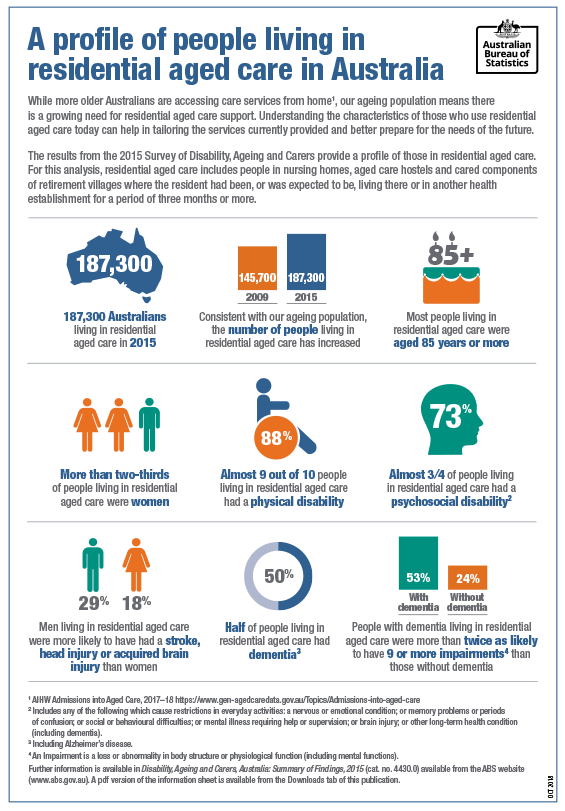A PROFILE OF PEOPLE LIVING IN RESIDENTIAL AGED CARE IN AUSTRALIA

While more older Australians are accessing care services from home1, our ageing population means there is a growing need for residential aged care support. Understanding the characteristics of those who use residential aged care today can help in tailoring the services currently provided and better prepare for the needs of the future.
The results from the 2015 Survey of Disability, Ageing and Carers provide a profile of those in residential aged care. For this analysis, residential aged care includes people in nursing homes, aged care hostels and cared components of retirement villages where the resident had been, or was expected to be, living there or in another health establishment for a period of three months or more.
- 187,300 Australians living in residential aged care in 2015
- Consistent with our ageing population, the number of people living in residential aged care has increased
- Most people living in residential aged care were aged 85 years or more
- More than two-thirds of people living in residential aged care were women
- Almost 9 out of 10 people living in residential aged care had a physical disability
- Almost 3/4 of people living in residential aged care had a psychosocial disability2
- Men living in residential aged care were more likely to have had a stroke, head injury or acquired brain injury than women
- Half of people living in residential aged care had dementia3
- People with dementia living in residential aged care were more than twice as likely to have 9 or more impairments4 than those without dementia
- AIHW Admissions into Aged Care, 2017–18 https://www.gen-agedcaredata.gov.au/Topics/Admissions-into-aged-care
- Includes any of the following which cause restrictions in everyday activities: a nervous or emotional condition; or memory problems or periods of confusion; or social or behavioural difficulties; or mental illness requiring help or supervision; or brain injury; or other long-term health condition (including dementia).
- Including Alzheimer’s disease.
- An Impairment is a loss or abnormality in body structure or physiological function (including mental functions).
Further information is available in
Disability, Ageing and Carers, Australia: Summary of Findings, 2015 (cat. no. 4430.0) available from the ABS website (
www.abs.gov.au). A pdf version of the information sheet is available from the Downloads tab of this publication
 Print Page
Print Page
 Print All
Print All
 Quality Declaration
Quality Declaration